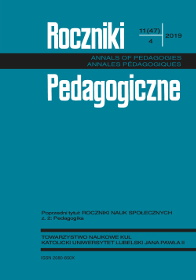Righteousness – a Forgotten Virtue. A Voice on the Issue of Reproduction of Righteousness in the Structure of Character and Personality of a Young Generation
Main Article Content
Abstract
The author of the article proposes that righteousness, even though itself an essential category of deontology and a moral value that constitutes the human being, is relatively rarely studied by representatives of social and humanistic sciences, such as pedagogics. Hence this paper aims at exploration of some issues within a wider framework of research on human righteousness. It is an attempt to answer the following questions: how does righteousness manifest itself in human behavior (especially in action)?; how can the symmetric opposite of righteousness, i.e. iniquity be recognized?; what kinds of iniquity can be identified?; how is a young person to be brought up in order to represent righteousness in the familial upbringing environment?; how to achieve the internalization of the norm “Be righteous” using the upbringing process?; how can upbringing be used to interiorize righteousness (as a value) in the structure of character and personality of children and the youth? Referring to the current state of knowledge the author emphasizes the significance of the interdisciplinary category of righteousness in the development of pedagogics. Apart from lexical explanations she also presents a scientific concept of righteousness as, among others: a virtue (collective), disposition (character traits), a norm (principles of demeanor), moral obligation, moral attitude, a component of the ideal of upbringing, an aim of upbringing, and a pedagogical building material. The author also presents manifestations and antonyms of righteousness (types of iniquity), significant in the development of pedagogical diagnostics, along with the specific character of the process of upbringing of the righteous human being, especially in the familial environment. Hermeneutic methods were utilized in order to thoroughly examine the studied issues.
Article Details
References
Derdziuk, A. (2019). Człowiek na maksa. Rzeszów: Bonus Liber Wydawnictwo i Drukarnia Diecezji Rzeszowskiej.
Fromm, E. (2000). Mieć czy być? (tł. J. Karłowski). Poznań: Dom Wydawniczy „Rebis”.
Frycz Modrzewski, A. (2003). Wybór pism (oprac. W. Voisé). Wrocław: Zakład Narodowy im. Ossolińskich – Wydawnictwo.
Grondin, J. (2007). Wprowadzenie do hermeneutyki filozoficznej (tł. L. Łysień). Kraków: Wydawnictwo WAM.
Hildebrand, D. (1982). Fundamentalne postawy moralne. Prawość. W: D. Hildebrand, J.A. Kłoczowski, J. Paściak, J. Tischner, Wobec wartości (s. 7-19). Poznań: W drodze.
Inny słownik języka polskiego PWN. P-Ż (2017). M. Bańko (red.). Warszawa: Wydawnictwo Naukowe PWN.
Jaśtal, J. (2015). Etyka i czas. Wariacje aretologiczne. Kraków: „Księgarnia Akademicka”.
Kant, I. (2015). Metafizyka moralności (tł. E. Nowak). Warszawa: Wydawnictwo Naukowe PWN.
Kunowski, S. (1946). Proces wychowawczy i jego struktury: temperament, indywidualność, charakter, osobowość. Zarys teorii. Lublin: Instytut Pracy Nauczycielskiej.
Mały słownik języka polskiego (1968). S. Skorupka, H. Auderska, Z. Łempicka (red.). Warszawa: Państwowe Wydawnictwo Naukowe.
Mistrz Wincenty Kadłubek (1996). Kronika polska (tł. B. Kürbis). Wrocław: Zakład Narodowy im. Ossolińskich.
Nowak, M. (2008). Teorie i koncepcje wychowania. Warszawa: Wydawnictwa Akademickie i Profesjonalne.
Nowak, M., Ożóg, T., Rynio, A. (red.) (2003). W trosce o integralne wychowanie. Lublin: Wydawnictwo Katolickiego Uniwersytetu Lubelskiego.
Opiela, M.L., Braun, K. (red.) (2017). W kręgu integralnego wychowania. Refleksja teologiczno-pedagogiczna. Lublin: Wydawnictwo „Werset”.
Opozda, D. (red.) (2015). Rodzina miejscem integralnego rozwoju i wychowania. Lublin: Wydawnictwo „Episteme”.
Podstawka, K. (2016). Prawość. W: K. Chałas, A. Maj (red.), Encyklopedia aksjologii pedagogicznej (s. 885-889). Radom: Polskie Wydawnictwo Encyklopedyczne POLWEN.
Słownik przewodnik filozoficzny. Osoby – problemy – terminy (2012). Maryniarczyk, A., Jaroszyński, P., Kiereś, H., Zdybicka, Z.J. (red.). Lublin: Polskie Towarzystwo Tomasza z Akwinu.
Żywczok, A. (2016). Wychować człowieka prawdomównego. Koncepcje, badania naukowe, wdrożenia. Katowice: Wydawnictwo Uniwersytetu Śląskiego.
Żywczok, A. (2017). Kłamstwo – zagrożenie dla trwałości związku małżeńskiego i spójności rodziny. Wychowanie w Rodzinie, 16 (2), 213-226.

